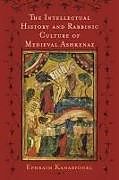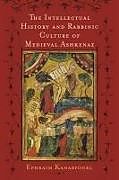Intellectual History and Rabbinic Culture of Medieval Ashkenaz, The
Einband:
Fester Einband
EAN:
9780814330241
Untertitel:
Englisch
Autor:
Ephraim Kanarfogel
Herausgeber:
Wayne State University Press
Anzahl Seiten:
584
Erscheinungsdatum:
17.12.2012
ISBN:
081433024X
Informationen zum Autor Ephraim Kanarfogel is the E. Billi Ivry University Professor of Jewish History, Literature, and Law at Yeshiva University. He is also the author of the award-winning books Jewish Education and Society in the High Middle Ages (1992), Peering through the Lattices: Mystical, Magical, and Pietist Dimensions in the Tosafist Period (2000), and The Intellectual History and Rabbinic Culture of Ashkenaz (2012), all published by Wayne State University Press. Klappentext In The Intellectual History and Rabbinic Culture of Medieval Ashkenaz, author Ephraim Kanarfogel challenges the dominant perception that medieval Ashkenazic rabbinic scholarship was lacking in intellectualism or broad scholarly interests. While cultural interaction between Jews and Christians in western Europe was less than that of Sephardic Jews, Kanarfogel's study shows that the intellectual interests of Ashkenazic rabbinic figures were much broader than Talmudic studies alone. Kanarfogel begins by highlighting several factors that have contributed to relatively narrow perceptions of Ashkenazic rabbinic culture and argues that the Tosafists, and Ashkenazic rabbinic scholarship more generally, advocated a wide definition of the truths that could be discovered through Torah study. He explores differences in talmudic and halakhic studies between the Tosafist centers of northern France and Germany, delves into aspects of biblical interpretation in each region, and identifies important Tosafists and rabbinic figures. Kanarfogel also examines the composition of liturgical poetry (piyyut) by Tosafists, interest in forms of (white) magic and mysticism on the part of a number of northern French Tosafists, and a spectrum of views on the question of anthropomorphism and messianism. Overall, Kanarfogel demonstrates that the approach taken by Tosafists was broader, more open, and more multi-disciplinary than previously considered. Medieval and Jewish history scholars will appreciate Kanarfogel's volume, which is the culmination of several decades of research on the subject. Zusammenfassung Challenges the dominant perception that medieval Ashkenazic rabbinic scholarship was lacking in intellectualism or broad scholarly interests. While cultural interaction between Jews and Christians in Western Europe was less than that of Sephardic Jews! Kanarfogel's study shows that the intellectual interests of Ashkenazic rabbinic figures were much broader than Talmudic studies alone. ...
Klappentext
In The Intellectual History and Rabbinic Culture of Medieval Ashkenaz, author Ephraim Kanarfogel challenges the dominant perception that medieval Ashkenazic rabbinic scholarship was lacking in intellectualism or broad scholarly interests. While cultural interaction between Jews and Christians in western Europe was less than that of Sephardic Jews, Kanarfogel's study shows that the intellectual interests of Ashkenazic rabbinic figures were much broader than Talmudic studies alone. Kanarfogel begins by highlighting several factors that have contributed to relatively narrow perceptions of Ashkenazic rabbinic culture and argues that the Tosafists, and Ashkenazic rabbinic scholarship more generally, advocated a wide definition of the truths that could be discovered through Torah study. He explores differences in talmudic and halakhic studies between the Tosafist centers of northern France and Germany, delves into aspects of biblical interpretation in each region, and identifies important Tosafists and rabbinic figures. Kanarfogel also examines the composition of liturgical poetry (piyyut) by Tosafists, interest in forms of (white) magic and mysticism on the part of a number of northern French Tosafists, and a spectrum of views on the question of anthropomorphism and messianism. Overall, Kanarfogel demonstrates that the approach taken by Tosafists was broader, more open, and more multi-disciplinary than previously considered. Medieval and Jewish history scholars will appreciate Kanarfogel's volume, which is the culmination of several decades of research on the subject.
Zusammenfassung
Challenges the dominant perception that medieval Ashkenazic rabbinic scholarship was lacking in intellectualism or broad scholarly interests. While cultural interaction between Jews and Christians in Western Europe was less than that of Sephardic Jews, Kanarfogel's study shows that the intellectual interests of Ashkenazic rabbinic figures were much broader than Talmudic studies alone.

Leider konnten wir für diesen Artikel keine Preise ermitteln ...
billigbuch.ch sucht jetzt für Sie die besten Angebote ...
Die aktuellen Verkaufspreise von 6 Onlineshops werden in Realtime abgefragt.
Sie können das gewünschte Produkt anschliessend direkt beim Anbieter Ihrer Wahl bestellen.
Loading...
Die aktuellen Verkaufspreise von 6 Onlineshops werden in Realtime abgefragt.
Sie können das gewünschte Produkt anschliessend direkt beim Anbieter Ihrer Wahl bestellen.
| # | Onlineshop | Preis CHF | Versand CHF | Total CHF | ||
|---|---|---|---|---|---|---|
| 1 | Seller | 0.00 | 0.00 | 0.00 |
